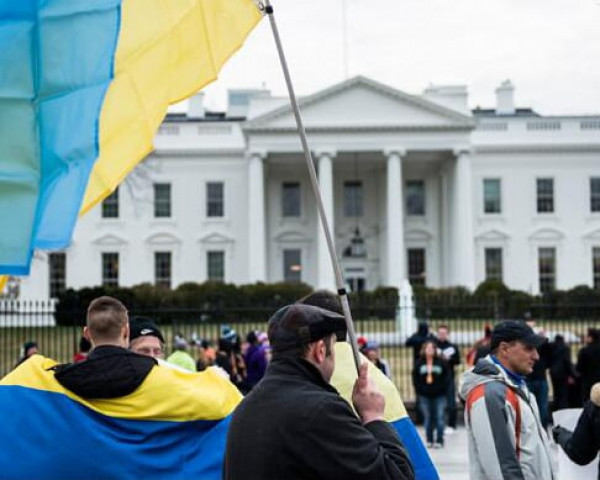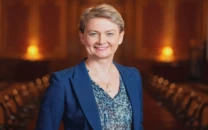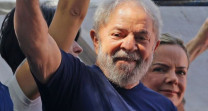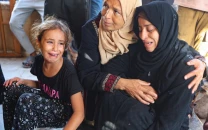Obama in 'direct' confrontation with Putin on Ukraine
Obama called on Putin to de-escalate situation by pulling his troops back to Russian barracks in Crimean peninusla.

Ukrainian supporters gather outside the White House in Washington on Saturday. PHOTO: AFP
Obama also spelled out the right of the people of Ukraine to chart their own destiny and symbolically began to line up the long-time Western alliance against Russia, calling the leaders of France and Canada.
The US leader's 90-minute telephone call with Putin represented the kind of direct confrontation between the men who run the White House and the Kremlin rarely seen since the end of the Cold War.
The White House account of the call was unusually detailed and blunt, hinting at tense exchanges as fractures deepened in a diplomatic relationship that has been deteriorating since Putin returned as president in 2012.
"President Obama expressed his deep concern over Russia's clear violation of Ukrainian sovereignty and territorial integrity," the White House said.
Obama told Putin that his actions were a "breach of international law, including Russia's obligations under the UN Charter, and of its 1997 military basing agreement with Ukraine."
The White House statement appeared designed to underscore the gravity of the situation, and as a message to political opponents who say Obama shows insufficient steel as a leader and declines to enforce US red lines.
Asked about the tone of the call, a senior US official resorted to diplomatic parlance indicating an uncomfortable conversation, describing it as "what you'd expect: candid and direct."
Obama team mulls options
Obama's national security team met at the White House to mull options on Ukraine, a day after the president warned that Putin's actions would incur "costs."
The US President told Putin those costs would entail an immediate halt from the US side to preparatory talks on the G8 summit in the Olympic resort of Sochi on the Black Sea in June.
The crisis deepened after Putin secured an endorsement by lawmakers to send troops to Ukraine.
Officials in Kiev had earlier said Russia had already dispatched 30 armored personnel carriers and 6,000 additional troops into Crimea to help pro-Kremlin militia gain broader independence from the new pro-EU leaders in Kiev.
Obama called on Putin to de-escalate the situation by pulling his troops back to Russian barracks in the Crimean peninusla.
But in a sign his appeal fell on deaf ears, a Russian readout of the call hinted at an expansion of the operation, as Putin reserved the right to protect Russian interests in eastern Ukraine.
Obama did use the call to recognise deep cultural ties between Ukraine and Russia and to state that there was a need to protect ethnic Russians in the former Soviet republic.
But the proper way to do that, he said, was through a dialogue with the government in Kiev formed following the ouster of the pro-Russian president Viktor Yanucovych.
He suggested the dispatch of international observers appointed by the United Nations Security Council and the Organization for Security and Co-operation in Europe (OSCE) to safeguard ethnic Russians.
Obama also stated strong support for the Kiev government and pledged to work with bodies like the International Monetary Fund, the OSCE and NATO to mitigate its deepening economic crisis and ensure its democratic aspirations.
The US president also called French President Francois Hollande and Canadian Prime Minister Stephen Harper, leaders of Atlantic nations along with Britain, which formed the backbone of post-war Western resistance to the Soviet Union.
The leaders expressed "grave concern" over Russia's intervention into Ukraine, a White House statement said.
Washington also upped the diplomatic offensive at the United Nations.
US Ambassador Samantha Power branded Russia's parliamentary approval "as dangerous as it is destabilising."
"The message is pull back your forces. Let us engage in political dialogue, engage with the Ukrainian government which is reaching out to you for that dialogue," Power said.
But meaningful action on the crisis at the UN seems unlikely, given Russia's veto power as a permanent Security Council member.
Before Putin and Obama connected, US Defense Secretary Chuck Hagel called his Russian counterpart Sergei Shoigu.
A US defense official said there had been "no change" to Washington's defense posture in the European region.
Another official said that Obama did not take part in the wider meeting of his national security officials, but was briefed by National Security Adviser Susan Rice and other key aides.
Washington appears to have limited options to change Putin's calculations.
In addition to snubbing the G8 summit, it could cut off economic and trade cooperation that Moscow wants to deepen, or impose sanctions on Russian finance institutions or key officials.
Obama could order a show of military support for US allies in eastern Europe through NATO, but wants to avoid a Cold War-style chess match with Moscow.
He also needs Russian support for several key foreign policy priorities including nuclear talks with Iran and destroying Syria's chemical arms.



















COMMENTS
Comments are moderated and generally will be posted if they are on-topic and not abusive.
For more information, please see our Comments FAQ